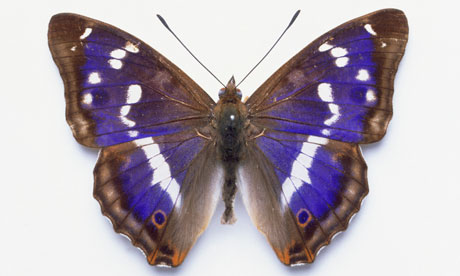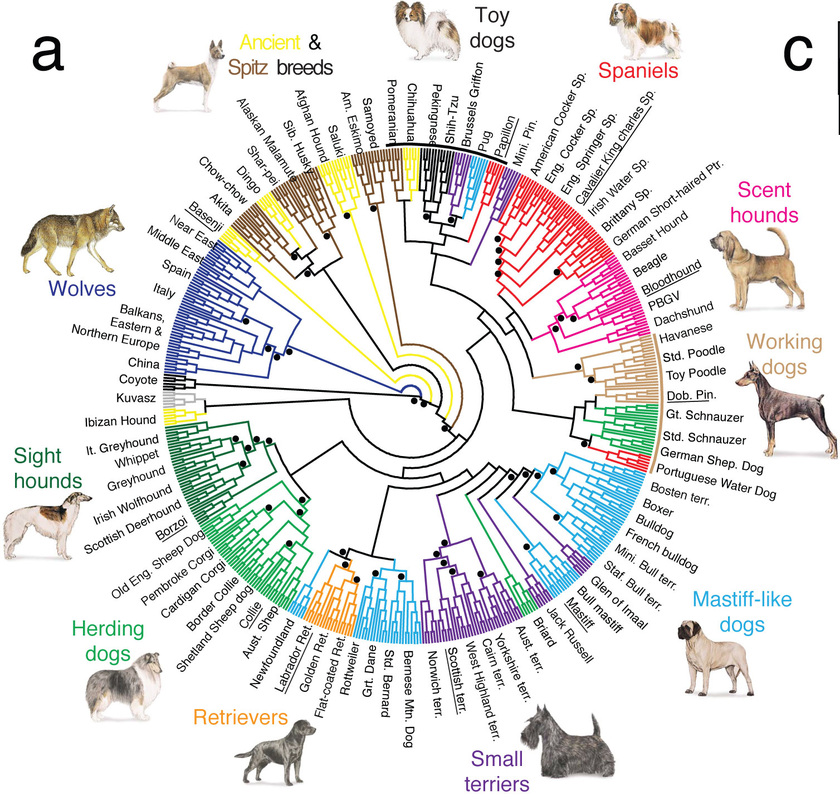| Devils Hole pupfish is pair at far right at 2:00. Amagosa pupfish is pair at 5:00 |
(*) Yeah, TOF knows: Berthold Brecht and all that; but Dave van Ronk done sung it and that makes it a folk song. So there.
Getting Specious
 |
| This ain't nothing but a hound dog. |
In sum, dogs/wolves (and polar bears/grizz) are separate species despite being interfertile while otherwise identical populations are accounted as separate species on other grounds entirely, such as to block a damn or logging. This sort of thing tends to bug mathematicians, who prefer their terms well-defined.
Meanwhile, the idea of species per se sits poorly on plants and not at all on asexual critters, not to mention some fungi of weirdness that alternate between asexual and bisexual generations.
Evolution
It has become a truism today that species evolve by- mutations of randomness
- filtered by natural selection
This led to the Darwinian Just-So Story. These stories take some trait: the peacock's tail, the Purple Emperor butterfly's diet, human speech, and so on, and spins an "adaptation tale" that shows how it is an evolutionary advantage to have it. (Of course, there are other species who do not have the trait, so the task is also to show how not having it is also advantageous.) There is no requirement to show that this story is in fact what did take place. It must merely sound plausible.
An example is the preference of the Purple Emperor butterfly to dine on carrion and fecal matter. Euuw! Adaptationists love to explain outre and transgressive behaviors, the more outre the better. In this case, the "reason" is that "the males replenish themselves after mating with sodium and other chemicals from the rotting matter." Thus we see, says philosopher Mary Midgley, the conscientious butterfly holding its proboscis and resolutely taking its medicine so as to be sure of keeping its love-life in order.
Presumably, Purple Emperors too fastidious to dine in this manner proved unfit and dropped out of the gene pool.The problem is that there is seldom any evidence for these evolutionary losers.
But as Midgley goes on to say:
A recent controversy about the origins of nose-picking in humans showed the oddity of this. Since this habit is common, scientists suggested an amazing number of arcane physical mechanisms by which it might have directly improved people’s survival-prospects. What nobody did was to ask about this habit’s relation to motives – for instance to curiosity, to our tendency to explore and investigate things. Like other primates we like to pry into mysterious places such as holes and this interest surely has affected our species-survival in many ways, both helpful and otherwise. The details of the endless acts that it produces don’t matter; what affects survival is the general interest. Thus, human behaviour is not a ragbag of disconnected behaviour patterns with separate evolutionary histories. What evolves is an emotional constitution which shapes our lives as a whole. We have to explain particular actions by finding their place in it. [emph. added]IOW, there is nothing particularly advantageous about nose-picking -- unless explaining it enables one to obtain grant money. That can be advantageous, we suppose. The advantage of the holistic approach is that it not only accounts for nose-picking, but also grant-seeking.
 |
| Charles Darwin wasn't always old and bearded |
In sexual selection, what matters is the aesthetic preference of the females, and it is a genuine, no-fooling actual selection taking place.
His Victorian compadres didn't catch on. They had convinced themselves that beauty was subjective and subjective things did not really exist. But ol' Chuck doubled down.
"The case of the male Argus pheasant is eminently interesting, because it affords good evidence that the most refined beauty may serve as a charm for the female, and for no other purpose. We must conclude that this is the case, as the primary wing-feathers are never displayed, and the ball-and-socket ornaments are not seen in their full perfection, except when the male assumes the attitude of courtship.... Many will declare that it is utterly incredible that a female bird should be able to appreciate fine shading and exquisite patterns. It is undoubtedly a marvellous fact that she should possess this almost human degree of taste, though perhaps she admires the general effect rather than each separate detail. He who thinks that he can safely gauge the discrimination and taste of the lower animals, may deny that the female Argus pheasant can appreciate such refined beauty; but he will then be compelled to admit that the extraordinary attitudes assumed by the male during the act of courtship, by which the wonderful beauty of his feathers is fully displayed, are purposeless; and this is a conclusion which I for one will never admit.” [emphases Midgley's]
Hey, babe! Come here often? How ya like these feathers?
 |
| Mwahahah! You can run but not hide! |
There is a sense in which Lamarck was on to something, but it turns selection inside out. What makes a trait "favorable" or not depends in large measure on what an organism is trying to do. Thus, a trait may become favorable because the members of a species have sufficient plasticity that they can adapt their behavior to the trait, not because the trait adapts them to the behavior.
This cuts against the grain of the Early Moderns, who regarded the lower animals as meat puppets enslaved to a instinct. But Aristotelian instinct was more supple than machine-agers assumed, and Darwin's sexual selection points toward it. It matters what the organism is trying to do.
Which brings us back to the pupfish.
It seems that natural selection is more actively selective than previously believed.
 |
| Devil's Hole pupfish |
The entire species of the Devils Hole pupfish lives in a rocky pool, 20 meters long and three meters wide, in a cave entrance in Death Valley, California. In 1976, conservationists established the fish in other pools elsewhere just in case Devil's Hole dried up. "But the refuge-bred fish began to look different, with deeper bodies and smaller heads, although all the fish [were] pretty much the same genetically."
Sean Lema, a graduate student at UC Davis, and Gabrielle Nevitt, professor of neurobiology, physiology and behavior, ... reared a related but unthreatened species, the Amargosa pupfish, in the lab on a restricted diet and with slight changes in water temperature. The Amargosa pupfish began to look more like the wild Devils Hole pupfish."
In other words, one kind of pupfish changed into another kind of pupfish when placed in the particular environment of the other. Significant adaptive variations appeared within two years. Since pupfish reach full maturity within 2 to 3 months and spawn from late February through the summer, that's about four or five pupfish generations. "No new information had appeared in the guppies’ DNA; instead, the expression of the existing information had altered."
Yet biologists find the speech of humans lurking in a gene (FOXP2, located on the long arm of chromosome 7 at position 31) and then say that since Neanderthals had the same gene, they must have had speech, too. They have also identified a "warrior" gene that is supposed to account for violent behavior. Koch's postulates have been forgotten, it seems.
The more we learn about genetics, it seems, the less certain we become of the origin of species -- or of the adequacy of natural selection to explain it. The lack of fit between natural selection and the fossil record is notorious. If natural selection theory were true, the evolutionary record would be a smear of continual incremental changes. Instead we see species appear almost fully formed in a geological instant and then persist until they clear out. It's not that the links are missing. It's that they should be the rule and not the exceptions. But the more we learn about epigenetics, genome plasticity, molecular edit/repair, and the like, the more it appears that evolution can be swift and specific and not a slow, gradual editing of a range of "random" mutations.
Mutations are not -- or at least, need not be -- "random." They can be focused and massive. There need not even be a mutation; simply a different expression of the same genes.
Well, what other mid-Victorian theory has survived unscathed?
References
- Sharon Begley, "Water-Flea Case Shows That Ability To Adapt Is What's Really Innate," The Wall Street Journal (April 22, 2005)
- Kimberly Johnson, "Lizards Rapidly Evolve After Introduction to Island," National Geographic News (April 21, 2008)
- Mary Midgley, "The Mythology of Selfishness," The Philosophers' Magazine online (05 January 2016)
- James A. Shapiro, "Rethinking the (Im)Possible in Evolution," Progress in Biophysics and Molecular Biology (2013)
- David Warren, "Phenotype plasticity." Essays in Idleness (28 Aug 2015)

















